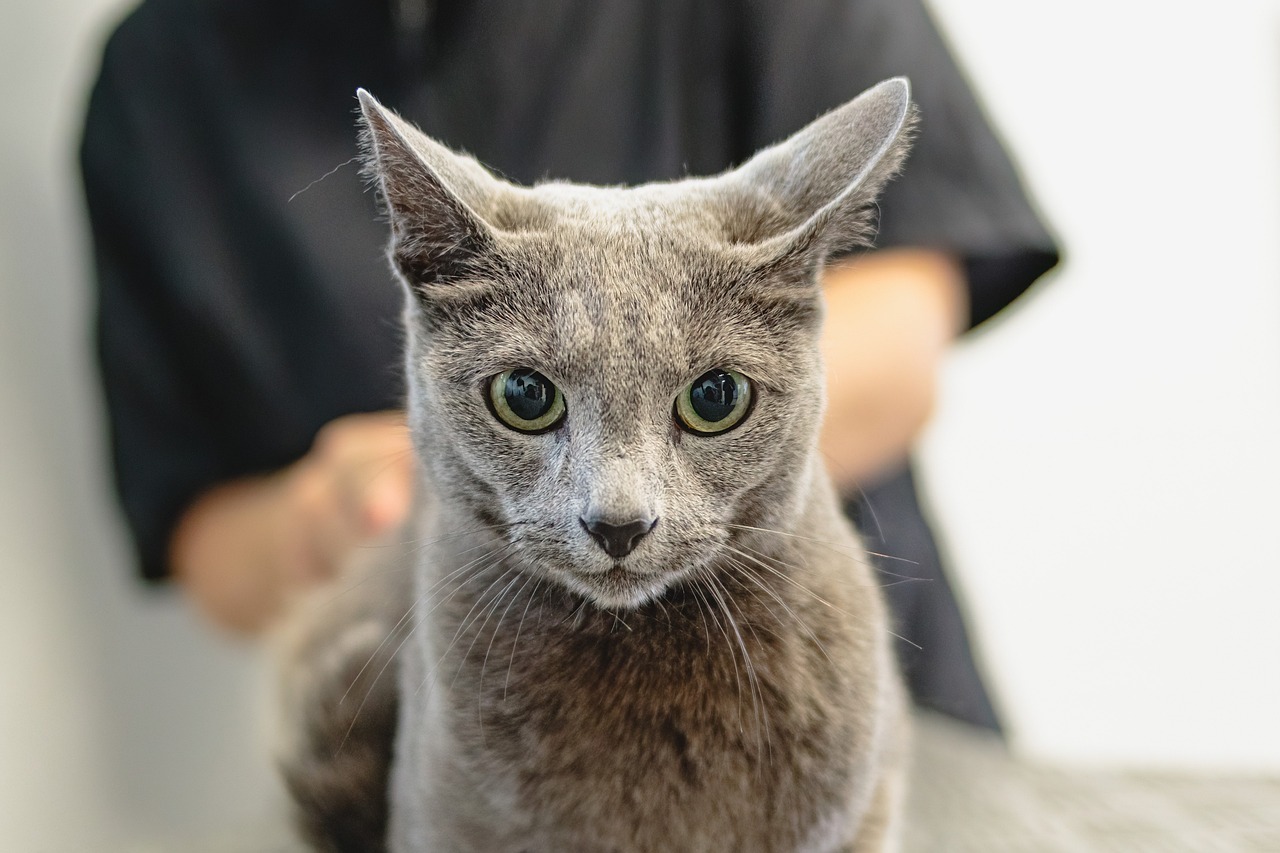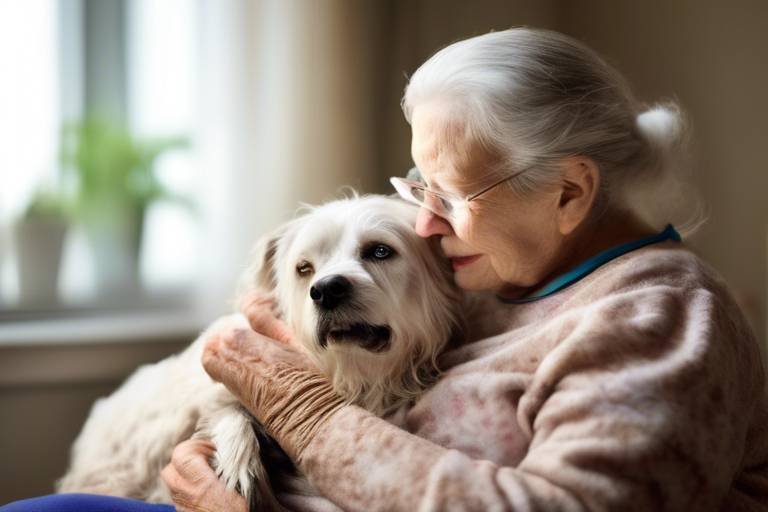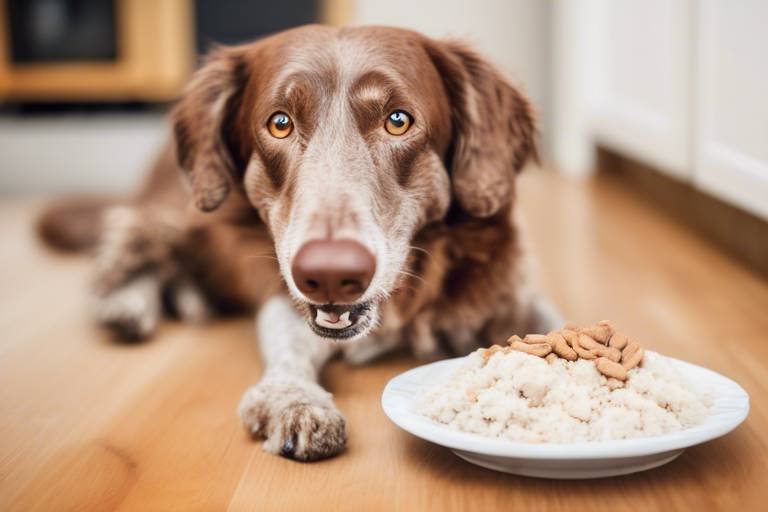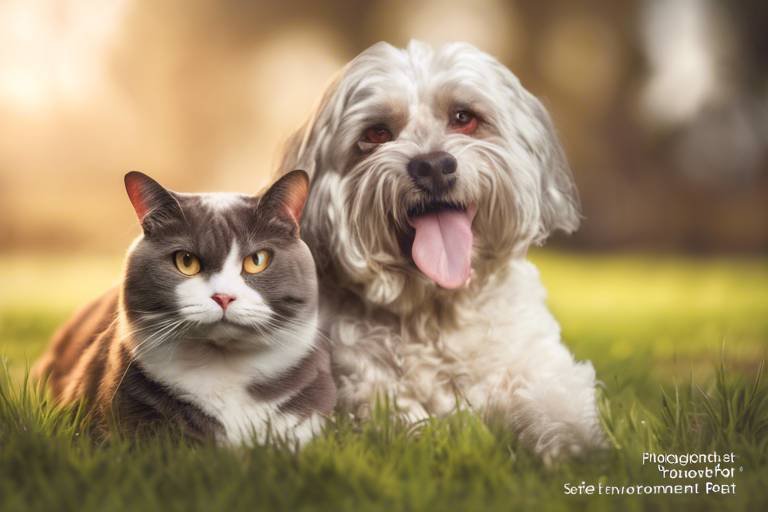Caring for Senior Pets with Chronic Conditions
As our furry friends age, they often face a myriad of challenges, especially when it comes to chronic conditions. Just like humans, senior pets can experience a range of health issues that require special attention and care. These chronic conditions can be anything from arthritis to diabetes, and they can significantly impact a pet's quality of life. As a responsible pet owner, it's essential to understand these unique needs and provide the right support to enhance their well-being.
Imagine having to deal with aches and pains every day; that's the reality for many senior pets. They may not be able to express their discomfort verbally, but their behavior often speaks volumes. You might notice them being less active, experiencing difficulty in getting up, or even showing signs of irritability. Recognizing these symptoms early on is crucial for seeking appropriate veterinary care and ensuring your pet receives the necessary treatment. It's not just about extending their lives; it's about improving the quality of those years.
One of the best ways to ensure your senior pet is comfortable and happy is by providing a nurturing and supportive environment. This includes understanding their specific chronic conditions and how these affect their daily lives. For instance, pets with arthritis may struggle to jump on the couch or climb stairs, while those with diabetes may require more frequent meals and careful monitoring of their diet. By being attentive to these needs, you can make a significant difference in their overall happiness.
Moreover, caring for senior pets with chronic conditions isn't just about managing their symptoms; it's about enriching their lives. Think of it as creating a tailored lifestyle plan that accommodates their limitations while still allowing them to enjoy their favorite activities. Whether it's a gentle stroll around the block or a cozy afternoon cuddle, every little bit counts in making their golden years truly special.
In the following sections, we will dive deeper into specific areas of care, including nutrition, exercise, and emotional support. Each of these plays a vital role in managing chronic conditions and ensuring that your beloved pet continues to thrive, even in their later years. So, let's embark on this journey of understanding and caring for our senior pets, ensuring they receive the love and attention they deserve.
- What are common chronic conditions in senior pets? Common chronic conditions include arthritis, diabetes, kidney disease, and heart disease.
- How can I tell if my senior pet is in pain? Look for signs such as decreased activity, changes in appetite, excessive grooming, or difficulty getting up.
- Should I change my senior pet's diet? Yes, it's important to consult with a veterinarian to tailor a diet that meets the specific needs of your pet's chronic condition.
- How much exercise does my senior pet need? Exercise should be tailored to your pet's abilities; gentle walks or play sessions are usually beneficial.
- When should I consult a veterinarian? If you notice any changes in behavior, appetite, or mobility, it's essential to consult a veterinarian for a thorough evaluation.

Understanding Chronic Conditions in Senior Pets
As our beloved furry companions age, they often face a range of health challenges that can significantly impact their quality of life. Chronic conditions in senior pets, much like in humans, can lead to a decline in overall well-being and require vigilant care from their owners. These conditions are not just occasional hiccups; they are ongoing health issues that demand continuous management and attention. Common ailments such as arthritis, diabetes, and kidney disease can affect mobility, appetite, and even mood, making it essential for pet owners to recognize the signs early on.
Imagine your pet as a cherished family member who has been by your side through thick and thin. Just as you would seek medical attention for a family member experiencing chronic pain or discomfort, the same should apply to your senior pet. Understanding the symptoms of chronic conditions can empower you to act swiftly and seek appropriate veterinary care. For instance, if your once-active dog now hesitates to jump onto the couch or your cat seems to be drinking water excessively, these could be red flags indicating underlying health issues.
Here are some common chronic conditions that senior pets may experience:
- Arthritis: This degenerative joint disease can cause significant pain and mobility issues, making it hard for pets to engage in their favorite activities.
- Diabetes: Similar to humans, pets can develop diabetes, leading to increased thirst and urination, weight loss, and lethargy.
- Kidney Disease: Chronic kidney disease is particularly prevalent in older pets, often resulting in increased thirst, frequent urination, and weight loss.
- Heart Disease: This can manifest as coughing, difficulty in breathing, and fatigue, affecting a pet's overall energy levels.
Recognizing these symptoms is just the first step. Once identified, it's crucial to consult with a veterinarian who can provide a proper diagnosis and treatment plan. Regular check-ups become even more vital as pets age, ensuring that any emerging issues are caught early. Don't hesitate to ask your vet about how to monitor your pet's health effectively. They can guide you on what to observe and how to manage any chronic conditions that may arise.
In addition to medical care, emotional support plays a significant role in the well-being of senior pets. Just like us, they can feel stressed or anxious, especially when dealing with chronic pain or discomfort. Providing a comforting environment, maintaining a routine, and offering gentle affection can help alleviate their emotional strain. Remember, your pet might not be able to tell you how they feel, but their behavior can provide clues. Pay attention to changes in their habits, and be proactive in addressing their needs.
Ultimately, understanding chronic conditions in senior pets is about being informed and attentive. Your pet relies on you to be their advocate, ensuring they receive the care they deserve. By staying vigilant and nurturing their physical and emotional health, you can help your senior pet lead a happier, more comfortable life.

Nutrition for Senior Pets
When it comes to caring for our beloved senior pets, nutrition plays a pivotal role in their overall health and well-being. As pets age, their bodies undergo various changes that can affect their dietary needs. It's not just about feeding them; it's about providing a balanced diet that caters to their specific health conditions and lifestyle. Think of it as tuning a classic car; you wouldn't just fill it up with any fuel, right? You'd want to ensure it runs smoothly with the right ingredients.
Senior pets often face chronic conditions such as arthritis, diabetes, and kidney disease, which necessitate a closer look at their food intake. For instance, pets with arthritis may benefit from diets rich in omega-3 fatty acids, which can help reduce inflammation. Similarly, diabetic pets require a diet low in simple carbohydrates to maintain stable blood sugar levels. Understanding these nuances is crucial for pet owners who want to enhance their furry companions' quality of life.
Moreover, maintaining a healthy weight is essential. Obesity can exacerbate existing health issues, making it vital to monitor their caloric intake closely. This is where portion control and the right choice of food come into play. High-quality protein sources and fiber-rich ingredients are often recommended to keep senior pets feeling full without overloading them with calories. It's like finding the perfect balance in a recipe; too much of one ingredient can spoil the dish.
To help pet owners navigate the complex world of senior pet nutrition, here’s a quick overview of essential dietary components:
| Component | Importance | Sources |
|---|---|---|
| Protein | Supports muscle maintenance and repair | Lean meats, fish, eggs |
| Omega-3 Fatty Acids | Reduces inflammation and promotes joint health | Fish oil, flaxseed |
| Fiber | Aids digestion and helps maintain a healthy weight | Vegetables, whole grains |
| Antioxidants | Supports immune function and combats aging | Berries, spinach, carrots |
It's also essential to consider hydration. Senior pets can be prone to dehydration, especially if they have chronic conditions that affect their thirst. Always ensure that fresh water is available and encourage them to drink regularly. Some pets may prefer wet food, which can also help increase their water intake. Think of it like a refreshing drink on a hot day; it’s not just about quenching thirst but also about keeping the body functioning optimally.
Finally, don’t forget the significance of consulting with a veterinarian. They can provide tailored advice based on the specific health needs of your pet, ensuring that their diet is not only nutritious but also safe. Regular check-ups can help adjust dietary plans as your pet’s health evolves. After all, the journey of caring for a senior pet is a partnership between you and your veterinarian, working together to keep your furry friend happy and healthy.
Special Diets for Common Ailments
When it comes to caring for our senior pets, understanding the importance of special diets tailored to their chronic conditions can make a world of difference. Just like humans, pets can suffer from various ailments as they age, and the right nutrition can help manage these issues effectively. For instance, pets with arthritis may require diets rich in omega-3 fatty acids, which are known for their anti-inflammatory properties. On the other hand, those battling diabetes need a diet low in simple carbohydrates to help regulate their blood sugar levels. It’s essential to recognize these dietary needs and adjust their meals accordingly to enhance their quality of life.
Let’s take a closer look at some common chronic conditions and the dietary adjustments that can help:
| Condition | Dietary Needs | Recommended Foods |
|---|---|---|
| Arthritis | High omega-3 fatty acids, low in inflammatory ingredients | Fish oil, flaxseed, sweet potatoes |
| Diabetes | Low glycemic index, high fiber | Vegetables, whole grains, lean proteins |
| Kidney Disease | Lower protein, phosphorus, and sodium | Specialized kidney diets, fresh water, certain vegetables |
It’s important to note that these dietary adjustments are not just about changing what goes into the bowl but also about understanding how these changes can affect your pet’s overall health. For example, a diet high in omega-3s not only helps with inflammation but can also improve coat health and boost the immune system. Similarly, a low-sodium diet for pets with kidney issues can help reduce the workload on their kidneys, ultimately prolonging their life.
Moreover, when creating a special diet plan, consider incorporating a variety of foods to ensure your pet receives a balanced diet. This might mean mixing different protein sources or adding fruits and vegetables that are safe for pets. However, it’s crucial to avoid common food pitfalls such as giving them human food that can be harmful. Always check with your veterinarian before making any significant changes to your pet's diet.
In conclusion, special diets tailored to common ailments in senior pets can significantly improve their quality of life. By understanding their unique needs and making informed dietary choices, you can help your furry friend feel more comfortable and active in their golden years. Don’t hesitate to reach out to your veterinarian for personalized recommendations that cater to your pet’s specific health conditions.
- What are the signs that my senior pet needs a special diet? Look for changes in weight, energy levels, or mobility, and consult your veterinarian if you notice any of these signs.
- Can I feed my pet homemade food? Yes, but it’s essential to ensure that the homemade diet is balanced and meets your pet's specific health needs. Consult with a vet for guidance.
- How can I tell if my pet is allergic to certain foods? Watch for symptoms such as itching, gastrointestinal issues, or changes in behavior, and discuss these with your vet.
Consulting with a Veterinarian
When it comes to caring for senior pets with chronic conditions, is not just a good idea; it’s essential. Imagine trying to navigate a complex maze without a map—this is what it feels like for pet owners who attempt to manage their furry friends' health without professional guidance. A veterinarian acts as that crucial map, helping you understand your pet's specific needs based on their age, breed, and health status. Regular veterinary visits can uncover underlying issues that might not be immediately apparent, ensuring your pet receives the best possible care.
During these consultations, it's important to discuss not only your pet's current health issues but also their dietary needs. For instance, if your dog is suffering from arthritis, your vet can recommend foods rich in omega-3 fatty acids, which are known for their anti-inflammatory properties. Similarly, if your cat has kidney disease, a vet might suggest a diet lower in protein but higher in essential nutrients to help manage their condition. This tailored approach to nutrition can significantly enhance your pet's quality of life.
Another critical aspect of these consultations is the opportunity to ask questions. Don’t hesitate to bring a list of concerns or observations about your pet's behavior, appetite, or mobility. Your veterinarian can provide insights that are often beyond the scope of general pet care advice. For example, if you notice your pet drinking more water than usual, this could be a sign of diabetes or kidney issues, prompting further investigation.
Moreover, the role of a veterinarian extends beyond just diagnostics and treatment plans. They can also help you navigate the sometimes overwhelming world of supplements and medications. With so many options available, having a professional guide you can ensure that you're making informed choices that align with your pet's health requirements. A well-structured veterinary plan can include:
- Regular check-ups to monitor chronic conditions
- Vaccination schedules to prevent additional health issues
- Recommendations for specialized diets or supplements
- Guidance on exercise routines tailored to your pet’s abilities
So, whether your pet is dealing with diabetes, arthritis, or any other chronic condition, remember that your veterinarian is your best ally. They are equipped with the knowledge and resources to help you make the best decisions for your beloved pet. Ultimately, investing time in these consultations can lead to a happier, healthier life for your senior companion.
Q: How often should I take my senior pet to the veterinarian?
A: It's generally recommended to take senior pets for check-ups at least twice a year, as they may require more frequent monitoring of their health conditions.
Q: What should I ask my veterinarian during consultations?
A: You should ask about your pet's specific dietary needs, any changes in behavior or health, and recommendations for exercise and supplements.
Q: Can I manage my senior pet's chronic condition without a vet?
A: While some minor issues may be managed at home, chronic conditions require professional oversight to ensure proper treatment and management.
Homemade Diets vs. Commercial Options
When it comes to feeding our beloved senior pets, the debate between homemade diets and commercial options can feel like navigating a minefield. Each choice has its own set of advantages and challenges, and understanding these can help you make the best decision for your furry friend. On one hand, homemade diets can offer a level of customization that commercial foods may not provide. You can tailor meals to meet your pet's specific health needs, ensuring they receive the right nutrients for their chronic conditions. For example, if your pet is suffering from kidney disease, you can prepare meals that are lower in protein and phosphorus, directly addressing their dietary requirements.
However, crafting a balanced homemade diet requires a good understanding of pet nutrition. It's essential to include the right proportions of proteins, carbohydrates, fats, vitamins, and minerals. Failing to do so can lead to nutritional deficiencies or excesses that could harm your pet's health. This is where consulting with a veterinarian becomes crucial. They can guide you in formulating a diet that meets all of your pet's needs, ensuring they are not only eating what they love but also what is healthy for them.
On the flip side, commercial pet foods are formulated to meet specific nutritional standards, making them a convenient option for busy pet owners. Many brands offer specialized formulas designed for senior pets or those with particular health issues. This can take the guesswork out of meal planning. However, not all commercial foods are created equal. Some may contain fillers, artificial preservatives, or low-quality ingredients that don’t provide the best nutrition for your pet.
| Aspect | Homemade Diets | Commercial Options |
|---|---|---|
| Customization | Highly customizable to specific health needs | Limited customization, but offers specialized formulas |
| Nutritional Balance | Requires careful planning and knowledge of pet nutrition | Formulated to meet nutritional standards |
| Convenience | Time-consuming to prepare | Quick and easy to serve |
| Quality Control | You control the ingredients | Quality varies by brand; requires research |
Ultimately, the choice between homemade diets and commercial options boils down to your pet's specific needs, your lifestyle, and your willingness to invest time in meal preparation. If you choose to go the homemade route, consider starting with simple recipes and gradually adjusting them based on your pet's response. If you lean towards commercial food, do your homework. Look for high-quality brands that prioritize wholesome ingredients and cater to your pet's health requirements.
In conclusion, whether you opt for homemade meals or commercial foods, the key is to ensure your senior pet receives a balanced diet that supports their health and enhances their quality of life. Always keep the lines of communication open with your veterinarian to make the best choices for your furry companion.
- Can I mix homemade and commercial food? Yes, many pet owners find success in combining both to offer variety and balance.
- How can I ensure my homemade diet is balanced? Consult with a veterinarian or a pet nutritionist for tailored advice.
- What should I avoid in commercial pet food? Look out for fillers, artificial additives, and low-quality protein sources.
Hydration and Its Importance
When it comes to caring for our beloved senior pets, hydration is often the unsung hero of their health. Just like humans, pets need water to survive, but as they age, their thirst mechanisms can become less reliable. This can lead to dehydration, which can exacerbate existing chronic conditions and create new health issues. Did you know that even a slight decrease in hydration can affect your pet's energy levels and overall well-being? It’s true! That’s why keeping your furry friend well-hydrated is crucial.
One of the most common reasons senior pets might not drink enough water is due to changes in their sense of taste and smell. If your pet is on medication for a chronic condition, it might also alter their appetite or thirst. Additionally, some pets may develop conditions like kidney disease, which can further complicate their hydration needs. Understanding these factors can help you take proactive steps to ensure your pet stays hydrated.
So, how can you ensure your senior pet is getting enough water? Here are some effective strategies:
- Fresh Water Availability: Always provide fresh, clean water. Change it daily and ensure the bowl is easy for your pet to access.
- Wet Food: Incorporating wet food into their diet can significantly increase their water intake. Many senior pets find wet food more palatable, which can encourage them to eat and hydrate simultaneously.
- Flavor the Water: Sometimes, adding a little flavor can entice your pet to drink more. Consider adding low-sodium broth to their water to make it more appealing.
- Water Fountains: Pets are often attracted to running water. Investing in a pet water fountain can encourage them to drink more frequently.
It’s important to monitor your pet’s hydration levels. Signs of dehydration can include dry gums, lethargy, and decreased skin elasticity. If you notice these symptoms, it’s essential to consult with your veterinarian immediately. They can assess your pet’s hydration status and recommend appropriate interventions.
In conclusion, hydration is a critical aspect of maintaining the health and quality of life for senior pets. By being vigilant and proactive about their water intake, you can help them thrive even in the face of chronic conditions. Remember, a well-hydrated pet is a happy pet!
Q: How can I tell if my senior pet is dehydrated?
A: Look for signs such as dry gums, lethargy, and decreased skin elasticity. If you're unsure, a quick check by your vet can provide peace of mind.
Q: Should I give my pet more wet food to help with hydration?
A: Yes! Wet food can significantly increase your pet's water intake and is often more appealing to them.
Q: Can I add flavor to my pet's water?
A: Absolutely! Low-sodium broth is a great option to entice your pet to drink more water.
Q: How much water should my senior pet drink daily?
A: On average, pets should drink about 1 ounce of water per pound of body weight. However, this can vary based on their diet and health conditions, so consult your vet for personalized advice.

Exercise and Mobility Considerations
When it comes to our beloved senior pets, ensuring they stay active is essential for their overall health and happiness. However, as pets age, their physical capabilities often change, which means we need to be more mindful about how we approach exercise. Think of it like adapting a favorite sport to accommodate an aging athlete; the goal is to keep them engaged without pushing them beyond their limits. This is especially crucial for senior pets dealing with chronic conditions, as their needs can be quite different from those of younger, spryer companions.
Regular exercise not only helps maintain a healthy weight but also promotes joint flexibility and muscle strength. However, it's important to tailor exercise routines to fit the individual needs of each pet. For example, a dog with arthritis may benefit from gentle walks on soft surfaces rather than vigorous runs on hard pavement. Similarly, a cat with mobility issues might enjoy interactive play sessions that don’t require jumping or climbing. Understanding your pet’s unique situation is the first step toward creating an effective exercise plan.
One effective way to ensure your senior pet remains active is through low-impact exercises. These can include:
- Short, leisurely walks
- Gentle swimming sessions (if your pet enjoys water)
- Interactive play with soft toys that don’t require jumping
- Low-impact agility exercises that involve navigating through tunnels or low hurdles
It's also important to incorporate mobility aids if your pet struggles with movement. Items like ramps, orthopedic beds, and non-slip mats can make a world of difference in helping your furry friend navigate their environment comfortably. Think of these aids as the training wheels for your pet’s golden years—providing support while allowing them to maintain their independence.
As you embark on this journey of keeping your senior pet active, it’s crucial to remain vigilant for signs of discomfort. Every pet is different, and what works for one might not work for another. Pay attention to cues such as:
- Excessive panting or drooling
- Reluctance to participate in activities they once enjoyed
- Changes in posture or gait
- Visible signs of pain, such as whimpering or limping
If you notice any of these signs, it may be time to reassess your exercise routine. Consult with your veterinarian to determine what level of activity is safe and beneficial for your pet. They can provide tailored recommendations based on your pet’s health status and any chronic conditions they may have.
In summary, keeping senior pets active requires a thoughtful approach that considers their individual needs and limitations. By adapting exercise routines and incorporating mobility aids, you can help your furry companions enjoy their golden years with vitality and joy. Remember, the goal is not just to keep them moving, but to enhance their overall quality of life. After all, our pets deserve the best care as they age, just as we would want for ourselves.
Q: How much exercise does my senior pet need?
A: The amount of exercise varies by pet, but generally, short sessions of 10-15 minutes, two to three times a day, are beneficial. Always consult your vet for personalized recommendations.
Q: What are the best low-impact exercises for senior pets?
A: Walking on soft surfaces, gentle swimming, and interactive play with light toys are excellent options. Activities should be tailored to your pet’s abilities.
Q: How can I tell if my pet is in pain during exercise?
A: Look for signs like limping, excessive panting, reluctance to move, or vocalizations. If you notice these signs, stop the activity and consult your veterinarian.
Q: Are there any mobility aids you recommend?
A: Yes! Ramps for getting into cars or onto furniture, orthopedic beds for comfort, and non-slip mats for stability can greatly assist senior pets.
Adapting Exercise Routines
When it comes to keeping our senior pets active, it's crucial to recognize that their exercise routines need to be adapted to their unique capabilities and health conditions. Just like how we adjust our workout plans as we age, our furry friends require a tailored approach to stay fit without risking injury or discomfort. The key is to strike a balance between keeping them engaged and respecting their limitations.
One effective way to adapt exercise routines is by incorporating low-impact activities. For instance, gentle walks can be a fantastic option. Instead of a brisk pace, consider a leisurely stroll around the block, allowing your pet to take their time and explore their surroundings. This not only provides physical benefits but also stimulates their senses. If your pet enjoys the outdoors, finding a safe, quiet park can be an excellent way to encourage exploration without overwhelming them.
Another option is to introduce short play sessions throughout the day. Rather than an extended period of vigorous activity, aim for several brief intervals of playtime with soft toys or interactive games. This method keeps their spirits high and helps maintain their muscle tone without overexerting them. Remember, it's essential to monitor their energy levels and adjust the duration based on how they're feeling.
To further enhance their exercise routine, consider using mobility aids. For pets that struggle with joint issues or arthritis, items like supportive harnesses or ramps can make a world of difference. These aids not only assist in movement but also encourage your pet to engage in activities they might otherwise shy away from due to discomfort. Always consult your veterinarian for recommendations tailored to your pet's specific needs.
Paying attention to your pet's body language is vital. Signs of discomfort, such as panting excessively, limping, or reluctance to continue, should never be ignored. If you notice any of these indicators, it may be time to take a break or adjust the activity. Remember, the goal is to promote health and happiness, not to push them beyond their limits.
In summary, adapting exercise routines for senior pets with chronic conditions involves a combination of low-impact activities, short play sessions, and the use of mobility aids. By being attentive to their needs and adjusting accordingly, you can help your beloved companions maintain their health and vitality in their golden years.
- How often should I exercise my senior pet? Aim for short sessions of exercise several times a week, adjusting based on your pet's energy levels and health status.
- What types of exercises are best for senior pets? Low-impact activities like walking, gentle fetch, and swimming are great options. Always avoid high-impact exercises.
- How can I tell if my pet is overexerting themselves? Watch for signs like excessive panting, limping, or reluctance to continue. If you notice these signs, it's best to stop and allow them to rest.
Recognizing Signs of Discomfort
When it comes to our beloved senior pets, being observant is crucial, especially as they navigate the challenges of chronic conditions. Just like how we might notice when our elderly relatives are feeling under the weather, pets often exhibit subtle signs that indicate discomfort. This can range from physical changes to alterations in behavior. Recognizing these signs early can make a significant difference in their quality of life. So, what should you be on the lookout for?
One of the most common indicators of discomfort in senior pets is a change in their usual behavior. If your once playful pup suddenly becomes lethargic and prefers to stay in their bed, it’s time to pay attention. Similarly, if your cat, who usually greets you at the door, starts hiding away, it could be a sign that they’re not feeling well. Additionally, vocalizations can be telling; increased whining or meowing might indicate pain or distress.
Physical signs are equally important to monitor. Look for:
- Changes in Appetite: If your pet is suddenly disinterested in food or water, it could signal discomfort.
- Altered Grooming Habits: Senior pets may neglect grooming due to pain, leading to matted fur or an unkempt appearance.
- Difficulty Moving: Watch for limping, stiffness, or reluctance to jump or climb stairs, as these can indicate joint pain or arthritis.
Another key aspect to observe is their reaction to touch. If your pet flinches when you pet them or seems sensitive to areas that were previously fine, it’s essential to investigate further. Sometimes, pets may also exhibit behavioral changes, such as increased aggression or irritability, which can be responses to pain. It’s a bit like when we’re not feeling our best; we can become a bit grumpy, right?
In addition to these signs, keep an eye on their bathroom habits. Changes in urination or defecation, such as straining or accidents in the house, can also indicate discomfort or underlying health issues. Remember, a pet’s comfort is paramount, and understanding their body language can help you provide the care they need. If you notice any of these signs, it’s crucial to consult with your veterinarian. They can help determine the cause of discomfort and suggest appropriate treatments or adjustments to improve your pet's well-being.
1. What are some common signs of discomfort in senior pets?
Common signs include changes in appetite, altered grooming habits, difficulty moving, and changes in behavior such as increased irritability or hiding.
2. How can I help my senior pet feel more comfortable?
Providing a comfortable resting area, ensuring they have easy access to food and water, and consulting with your veterinarian for pain management options can greatly enhance their comfort.
3. When should I consult a veterinarian about my pet's discomfort?
If you notice any significant changes in behavior, appetite, or mobility, it’s best to consult your veterinarian promptly for a thorough evaluation.
Frequently Asked Questions
- What are some common chronic conditions in senior pets?
Senior pets often face a range of chronic conditions such as arthritis, diabetes, kidney disease, and heart problems. These ailments can significantly affect their daily lives, making it essential for pet owners to recognize the symptoms and seek appropriate veterinary care.
- How can I improve my senior pet's nutrition?
Improving your senior pet's nutrition involves providing a balanced diet tailored to their specific health needs. Consult with your veterinarian to identify the best food options, which may include special diets for chronic conditions. Incorporating high-quality ingredients and adjusting feeding routines can help maintain their health and manage their weight.
- Are homemade diets better than commercial pet food?
It depends on your pet's individual needs. Homemade diets can offer fresh ingredients and customization, but they require careful planning to ensure nutritional balance. On the other hand, commercial pet foods are formulated to meet specific dietary requirements. It's best to discuss both options with your veterinarian to determine what works best for your senior pet.
- How important is hydration for senior pets?
Hydration is crucial for senior pets, especially those with chronic conditions. Ensuring they have access to fresh water at all times and monitoring their water intake can help prevent dehydration. Some pets may benefit from wet food or added water to their meals to encourage hydration.
- What types of exercise are suitable for senior pets?
Exercise for senior pets should be low-impact and tailored to their abilities. Activities like short walks, gentle play, and swimming can keep them active without overexerting them. Always observe your pet for signs of discomfort and adjust their exercise routine as needed.
- How can I tell if my senior pet is in pain during exercise?
Signs of discomfort in senior pets may include limping, reluctance to move, excessive panting, or whining. If you notice any of these behaviors, it's important to stop the activity and consult your veterinarian for guidance on how to adjust their exercise routine safely.



















